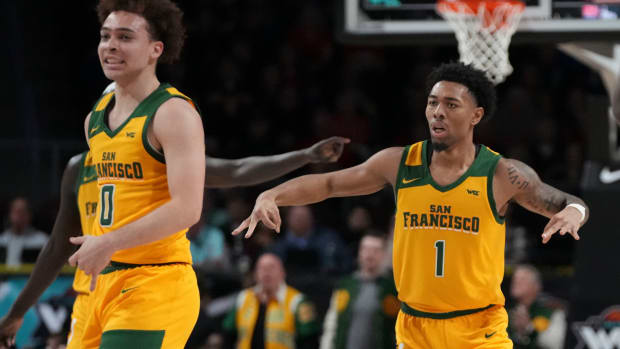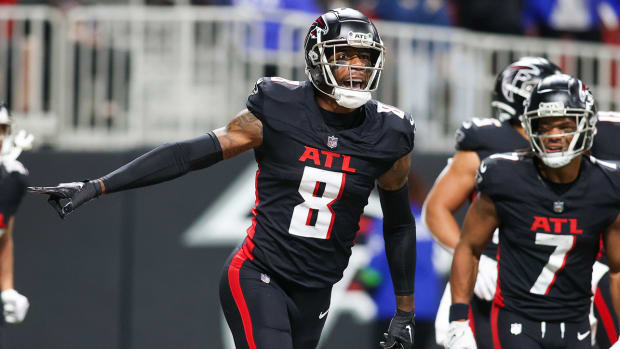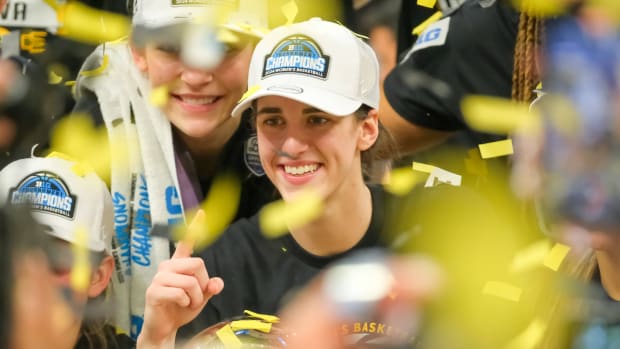The New King of Sacramento's Kings Scoffs in the Face of Long Odds
Kyle Terada-USA TODAY Sports
As part of an exploration of underdogs for The New Yorker in 2009, Malcolm Gladwell profiled new Sacramento Kings owner Vivek Ranadivé and described the methodology he used to create a competitive 12-year old girl's basketball team with players who were, by and large, “little blond girls” from Silicon Valley. The tl;dr version is that Ranadivé perceived an inefficiency in standard basketball strategy—namely, the conceding of almost 3/4th of the court when on defense—and coached his team to run a full-court press designed to force turnovers and create easy lay-ups. The team's relentless D helped to mitigate their offensive limitations and propelled them to the third round of the nationals, where they ran into a referee who took philosophical issue with the press and called fouls against Ranadivé's squad in a 4:1 ratio. The team lost that game, but by any realistic pre-season measure, they shouldn't have been in such a big game in the first place.
As Ranadivé concludes his investment group's purchase of a majority stake in the Kings, a small-market team that went 187-371 over the past seven seasons, it's clear that his skills and experience will be relevant, applicable and, to say the least, much appreciated. What Ranadivé did with the middle school girls' team is the same thing he has done throughout his adult life: he looks for opportunities and identifies ways to capitalize on them. Then, regardless of the odds against him, he succeeds. It's more or less reflexive at this point.
In the mid-1970s, when he was in his teens, Ranadivé emigrated to America from Mumbai, India. He had seen a documentary about MIT and decided immediately that it was where he wanted to enroll. But, aside from the challenge of getting admitted, he had to navigate strict government bureaucracy that made it very difficult for Indians to acquire foreign currency. “I actually talked my way into the office of [the Reserve Bank of India],"Ranadivé said. "I was 16 years old at that time. I requested them that I should be allowed to get some foreign exchange so that I could go to MIT. After all the effort, I showed up on the shores of America (Boston) with one quarter’s tuition paid for because of the foreign exchange restriction and less than a $100 in my pocket. Since then I have been on my own.”
In 1985, he founded Teknekron, a company whose technology, according to the New York Times, facilitated "the seamless sharing of data by computers and networks, even if the data comes from different sources or are in different software languages." This enabled Wall Street financial traders to aggregate and process information from disparate databases in real time. The first contract was with former Treasury Secretary Bob Rubin, who was then at Goldman Sachs. Ranadivé notes that he was competing with "Goliaths" such as IBM and Reuters, but Teknekron's software nevertheless became widely adopted on Wall Street. In 1993, the David-sized company was purchased by Reuters for $125.1 million.
Jesse D. Garrabrant/NBAE via Getty Images
Four years later, in 1997, Ranadivé founded a real-time data analysis firm named Tibco Software Inc. Its success would eventually compel Esquire, in 2012, to do a story about Ranadivé that profiled Tibco and the new project it was about to unveil: TopCom, a private social network for the world's most powerful leaders. From the story:
Ranadivé's company created the TopCom version [of the social network tibbr] specifically for the World Economic Forum, the organization founded in 1971 by the German economist Klaus Schwab, which gathers together the world's business, intellectual, and political leaders to discuss common issues. Because the organization has a hierarchy, so does TopCom: The top two hundred WEF members — basically, the people who run the world — can speak to one another on a given subject, and then they can choose to loop in members from lower tiers (experts, academics, etc.) as needed, widening the pool of knowledge on whatever problem is on the table.
It is, Schwab says, a "Facebook for global leaders."
Tibco, Esquirecontinued, has also worked with casinos to analyze specific customers' tendencies, with Con Edison to "computerize the underground electrical grid to minimize power failures" in New York City and with Homeland Security's National Cyber Security Division on counterterrorism measures. Across this wide spectrum of different applications, the constant motif in Ranadivé's success lies in thorough, real-time data analysis. "A little bit of the right information, just a little bit beforehand -- whether it is a couple of seconds, minutes, or hours -- is more valuable than all of the information in the world six months later," he has said. Spoken like a man well-versed in using any edge, no matter how small, to gain the upper hand.
To what extent this so-called "two-second" advantage will be relevant as Ranadivé tries to resurrect the Kings remains to be seen, but he does arrive in Sacramento with some brief, though successful, NBA experience. In 2010 he became a member of Joe Lacobs' ownership group, which then bought the Golden State Warriors. Since the organization took over, the team's front office has made a couple particularly noteworthy decisions: Before the 2011-12 season, they took a risk on rookie head coach Mark Jackson, hiring him out of the broadcasting booth despite his not having any professional coaching experience. Then, prior to this season, the team signed Stephen Curry to a four-year, $44 million right before the sniper and team leader made a leap that would have given him leverage to push for substantially more. That foresight will provide the franchise with the financial flexibility that will be needed to sign Klay Thompson and Harrison Barnes after their rookie deals expire.
On the administrative side, Ranadivé mapped out an ambitious technological plan for the Warriors' Oracle Arena. He had intended to use data and technology to optimize fans' in-arena experiences vis-a-vis their overall enjoyment and their purchases. It's a safe bet that Ranadivé and his team will similarly emphasize those sorts of gameday innovations and improvements as they try to get more fans (however demanding they might be) to show up to watch a Kings squad that ranked dead last in attendance this past season. (Improving the team itself is probably high on the to-do list, as well.)
AP Photo/Ted S. Warren
That he even finds himself in that particular "David" situation—y'know, the whole "roster full of promising yet underwhelming young players that no fans are coming to see"—is a testament to how he emerged victorious in what was, at least on paper, a longshot pursuit of the Kings. Seattle was the sentimental favorite, a passionate larger market with a sports-mad fanbase and an ownership group, led by hedge fund manager Chris Hansen and Microsoft CEO Steve Ballmer, that was willing to continually pony up more cash to bring a team back to the the Emerald City. For much of the negotiations, every indication was that the Seattle group was going to prevail simply by force of will.
But, as is his wont, Ranadivé found a way to outmaneuver his Pacific Northwest rivals. Throughout the Kings' bidding process, he and his group worked closely with Sacramento mayor Kevin Johnson to secure $258 million in public financing for a much-needed new arena. Additionally, Ranadivé collaborated with league commissioner David Stern to draw up a plan that grants concessions to the 29 other owners: specifically, the Kings agreed to opt out of the league's revenue sharing, costing the team $18 million next season and an estimated $15 million annually in subsequent years.
Conventional wisdom would suggest that this forfeiture, and the hellacious amount of work ahead necessary to overhaul the entire organization, would result in a competitive disadvantage for the small-market Kings. And conventional wisdom would be correct. But we've learned time and again that competitive disadvantages bring out the best in Vivek Ranadivé. Sacramento's situation makes it an unquestionable underdog for the foreseeable future—and that should make every other team in the league uneasy.








